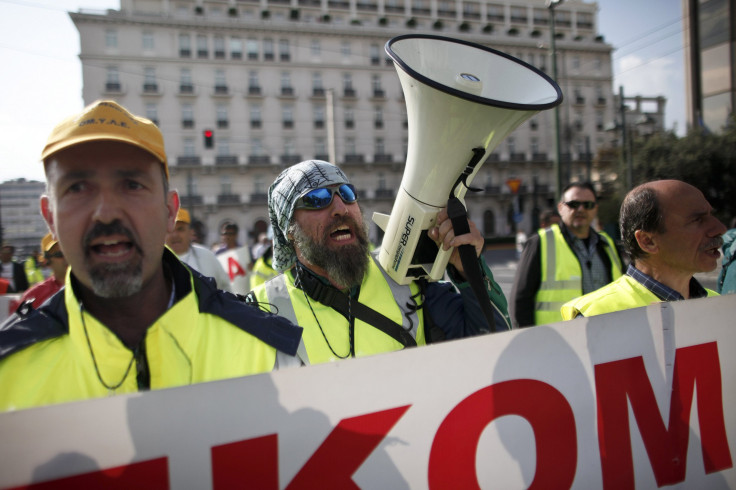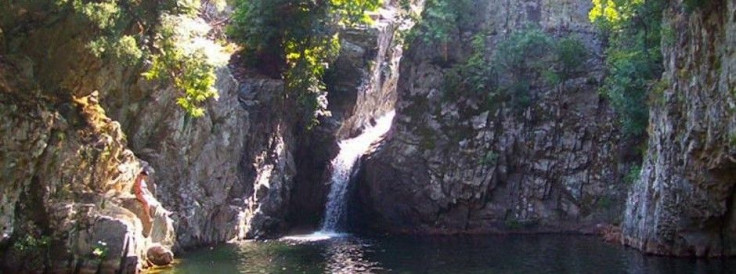Greek Debt Crisis: Asset Sale Plan Central To Bailout Strains Credulity

Thermopylae, Greece’s legendary “hot gates,” earned its fame as the site where King Leonidas and his band of 300 valiantly defended Sparta from the Persian onslaught. Two and a half millennia later, the Greeks have weathered another bruising battle, now with creditors just as fearsome as Xerxes’ army. In its terms of surrender this time around, Greece must bundle up state assets as collateral for the country’s outsize debts.
Appropriately, one of the properties currently on offer by Greece’s privatization fund is the ancient site of Thermopylae.
Boasting its namesake thermal hot springs, it also comprises “dated hotels” and a chapel, and it is just one of the public assets in the mix if the Greek government assents to the most recent bailout proposal hammered out by Prime Minister Alexis Tsipras and Greece’s eurozone creditors.
The program, detailed in the agreement released early Monday, would seek to raise 50 billion euros ($55 billion) over roughly 10 years to recapitalize banks and ease the national debt.
But it remains unclear where the Greek government will dig up this 50-billion-euro bounty, which amounts to 20 percent of the national economy. Speaking to Bloomberg Tuesday, Greek Economy Minister Giorgios Stathakis suggested that privatization projects and assets amounting to that total “obviously do not exist.”

Past efforts to woo international investors don’t bode well for the current proposal. A program tied to previous bailouts in 2011 sought to raise 50 billion euros by the end of 2015 through sales of everything from sewage facilities to a horse racing company.
So far, however, it has yielded only 3.2 billion euros, the result of economic free fall and government foot-dragging.
”I don’t know where the 50 billion comes from,” says Alexander Afouxenidis, a political sociologist at the National Center for Social Research in Athens, who has studied Greek privatization. “There was never hard evidence promoted by anybody, even the IMF [International Monetary Fund], with regard to this particular issue.”
Missed Targets
The issue of government asset sales was one of the few points of contention that nearly derailed the emergency summit held last weekend to prevent a Greek exit from the euro. European finance ministers insisted that Greece establish a portfolio of state assets to be sold, but let it be administered independently, on foreign soil.
This demand ended up being one of the few that Prime Minister Alexis Tsipras managed to rebuff. Greece will still need to come up with the 50 billion euros if the deal goes through, but it can administer the fund on its own soil.
Half of the proceeds would pump up bank capital, a quarter would pay off debts and a quarter would be reinvested. Eurozone authorities would supervise the fund.
It’s not the first time Athens has been tasked with privatizing state assets. When Greece first received bailout funds from the European Central Bank, IMF and eurozone countries -- the so-called troika, its creditors set a target of 50 billion euros in five years, which they hoped would take a 1 percent bite out of the country’s debt.
But privatization yielded only a trickle of income. By 2013, the IMF revised its goal to 10 billion euros by the end of 2015, a goal Greece is still likely to miss by about half.
Numerous obstacles to privatization stand in the way. Until recently, Greece lacked a functioning property registry, making land claims a bureaucratic nightmare. Corruption and kickbacks run rampant in state-owned businesses, for example, with the national railway system.
And citizens have cried foul over deals they perceive as shortchanging the public. Greece’s 2013 sale of its national lottery, for instance, was marred by a subsequent investigation into conflicts of interest.
Local bureaucrats and politicians devoted to maintaining state resources also hamstring investment deals. “It’s very frustrating,” says Philip Ammerman, whose firm Navigator Consulting Group advises privatization deals. “The only barrier is political.”
Ammerman recalls hotel deals he worked on stalling as investors scrambled to secure permits from as many as 40 state regulators, some of whom stood politically opposed to privatization. “At that point, it just falls apart.”
Blood From A Stone
It doesn’t help that Greece’s economy has tanked since 2011, decimating the value of publicly traded firms. The IMF’s initial 2011 appraisal, which saw Greek assets totaling 50 billion euros, relied on “valuing listed companies at their market price.” Yet companies listed on the Athens Stock Exchange have fallen in value by more than 50 percent since that time.
But as the Greek economy has shifted into deep recession -- especially following the tumultuous last few weeks of bank closure and Grexit fear -- the eurozone asset estimate has stood constant. “It’s an overstatement of the actual value that those assets have,” says Afouxenidis.
Still, some state-owned assets can indisputably put a drag on the economy. Athens’ former airport, for instance, sits on 1,500 acres of prime real estate edged by 2 miles of Mediterranean coastline. The state takes in no revenue on the land, yet it paid annually for security and basic maintenance.
Only this February did a years-long proposal to develop the site as a 7-billion euro construction project go through.
”Greece is just full of [long delayed projects] like that,” says Ammerman.
But Ammerman is among those who sees the 50 billion euro target as ambitious. One of the biggest stumbling blocks is the government itself.
Syriza, the left-wing coalition hoping to hold onto power as the government mulls passing new austerity measures this week, has not taken kindly to widespread privatization. Among Tsipras’ first moves in office was to halt privatizations the previous conservative government had attempted.
But some deals still inched through. The Chinese shipping company Cosco is in talks to buy Athens’ Port of Piraeus, Greece’s largest port and its shipping hub.
But even that sale would be a drop in the bucket. And if privatizations pick up pace again, popular resentment is likely to grow. Part of Syriza’s sweep to power in January included an appeal to citizens who felt they were losing public assets in a fire sale. Monday's proposal, inimical to Syriza's professed ideology, represents a significant political victory for Germany and other creditor countries.
“More than ever, it’s a question of politics, not hard-core economics,” Afouxenidis says.
© Copyright IBTimes 2025. All rights reserved.






















